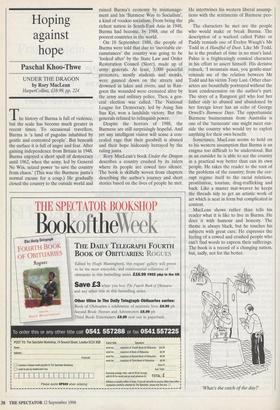Hoping against hope
Paschal Khoo-Thwe
UNDER THE DRAGON by Rory MacLean HarperCollins, £16.99, pp. 224 The history of Burma is full of violence, but the scale has become much greater in recent times. To occasional travellers, Burma is 'a land of pagodas inhabited by gentle and contented people'. But beneath the surface it is full of anger and fear. After gaining independence from Britain in 1948, Burma enjoyed a short spell of democracy until 1962, when the army, led by General Ne Win, seized power 'to save the country from chaos.' (This was the Burmese junta's normal excuse for a coup.) He gradually closed the country to the outside world and ruined Burma's economy by mismanage- ment and his 'Burmese Way to Socialism', a kind of voodoo socialism. From being the richest nation in South-East Asia in 1948, Burma had become, by 1988, one of the poorest countries in the world.
On 18 September 1988, the people of Burma were told that due to 'inevitable cir- cumstances' the country was going to be 'looked after' by the State Law and Order Restoration Council (Slorc), made up of army generals. At least, 3,000 peaceful protesters, mostly students and monks, were gunned down on the streets and drowned in lakes and rivers, and in Ran- goon the wounded were cremated alive by the army and military police. Then, a gen- eral election was called. The National League for Democracy, led by Aung San Suu Kyi, won a landslide victory. But the generals refused to relinquish power.
Despite the horrors of 1988, the Burmese are still surprisingly hopeful. And yet any intelligent visitor will sense a con- cealed rage that their goodwill is abused and their hope hideously betrayed by the ruling junta.
Rory MacLean's book Under the Dragon describes a country crushed by its rulers where its people are cowed into silence. The book is skilfully woven from chapters describing the author's journey and short stories based on the lives of people he met. He intertwines his western liberal assump- tions with the sentiments of Burmese peo- ple.
The characters he met are the people who would make or break Burma. The description of a warlord called Pahte or Paddy reminds one of Evelyn Waugh's Mr Todd in A Handful of Dust. Like Mr Todd, he is the product of time in no man's land. Pahte is a frighteningly comical character in his effort to assert himself. His derisive remark, 'I mountain man, you gentle-man' reminds me of the relation between Mr Todd and his victim Tony Last. Other char- acters are beautifully portrayed without the least condescension on the author's part. The story of a Rangoon girl who lost her father only to abused and abandoned by her foreign lover has an echo of George Orwell's Burmese Days. The opportunistic Burmese businessman from Australia is one of the 'turncoats' one might meet out- side the country who would try to exploit anything for their own benefit.
Sometimes, MacLean seems to hold on to his western assumption that Burma is an enigma too difficult to be understood. But as an outsider he is able to see the country in a practical way better than can its own people. He takes the reader to the root of the problems of the country; from the cor- rupt regime itself to the racial relations, prostitution, tourism, drug-trafficking and back. Like a master mat-weaver he keeps the threads tidy to get an artistic work of art which is neat in form but complicated in content.
MacLean shows rather than tells his reader what it is like to live in Burma. He does it with humour and honesty. The theme is always black, but he touches his subjects with great care. He expresses the feeling of a cowed and crushed people who can't find words to express their sufferings. The book is a record of a changing nation, but, sadly, not for the better.
'What's the catch of the day?'


































































 Previous page
Previous page